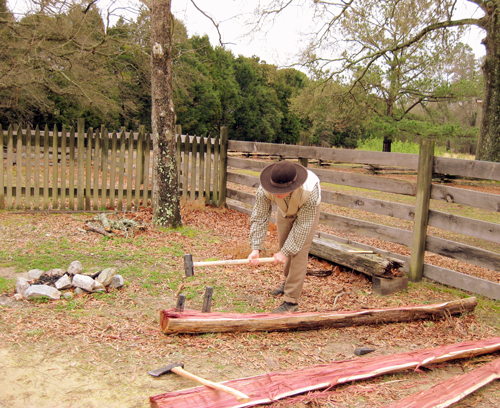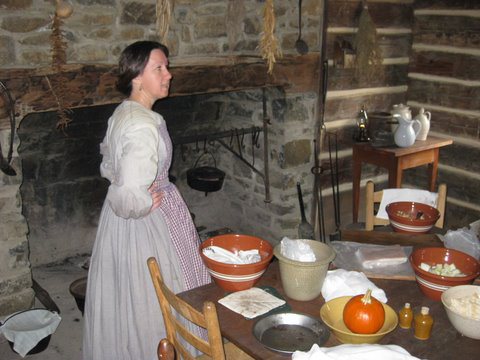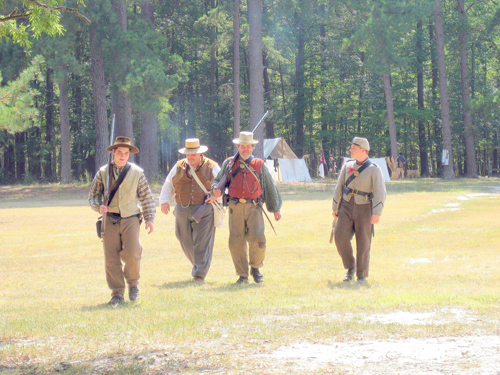Life was tough for adults and children in the mid 1800’s, especially on small farms like the Bennetts. It became increasingly much more difficult as the men went off to fight in the war in the 1860’s. There were many responsibilities shared by all to keep the household in operation. Unlike the few plantations which existed in America at that time, the Bennett Family like most did not own any African Americans to assist with their chores and the maintenance of their 189 acre farm. The entire family pitched in to help.

The morning began very early around 5:30 am as the mother rekindled the fire in the kitchen and main house from the night before, and the children helped milk the cows, get water from the well, and pick up the eggs from the chicken nests, which would ultimately become their breakfast. The father began to harness the mules or horses for the day’s work and organize his tools unless firewood needed to be chopped to start or continue the fires in the kitchen and home. Fences may also have needed to be mended prior to the morning meal if animals needed to be corralled. After breakfast it was then time to get the day’s real work going.
After several hours of James, Lorenzo, and Alphonzo working in the fields and Nancy and Eliza preparing food in the kitchen and performing some basic chores around the farmyard, the family came in to the kitchen house for dinner, where they typically sat down and ate together as a family. Some days when there was much work to be done the mid day meal may have been very short in order to get crops planted or harvested before sundown. Other days the men may have taken the wagon in to Hillsborough about 8 miles away to pick up supplies and tools, which made for virtually a full day.
Supper was the final meal of the day in which the family sat down together to share the day’s activities and any news that may have been shared by travelers passing along the Hillsborough Road. After supper, the family began to end their day with bathing perhaps only a few times a week, reading, studying their Bible, writing letters to family and friends in other communities, and finally extinguishing the fires to end the day. Then it was the same routine all over again the following day.
In the case of James and Nancy Bennett, they had several businesses in operation to keep them financially afloat. In addition to their farming, they sewed clothes and made shoes, rented rooms in their house to travelers, sold some whiskey, and even used their wagon as a “taxi service” to take people to the local communities of Chapel Hill and Hillsborough. Farming was very hard and simply not enough to pay the bills owed on the farm and tools and supplies to keep it running.
Life in the 1800’s for the Bennetts and other Americans North and South was quite tough and challenging on a day to day basis, and very mundane for children and young people like Lorenzo, Eliza, and Alphonzo. Thus, the reason so many young men ran off to join the military to escape the constant routine and rule of their parents. Lorenzo however, did not go off to fight for these reasons, as he had already begun his own family when the American Civil War broke out, and he did not rush off to join the Southern cause right away. However, thousands of young men and boys who had worked on farms as well as factories and shipyards did, and they found out quickly that the military was much harsher and even dangerous than life at home.

Today, on the Bennett Farm, students can walk the very ground where the Bennett family members lived and worked prior to one of the most significant events in American history coming in to their parlor. They will experience a unique opportunity to visit with a civilian of the 19th century in rural North Carolina. Included in this educational meeting, students will learn about daily life on a Piedmont North Carolina farm during the American Civil War period. The historical interpreter will show them the kitchenhouse and the aspects of preparing the three meals of the day; breakfast, dinner, and supper. Students will also learn about the chores that most children and young adults assisted with around the farm, and then they will venture to the garden to learn about the vegetables and herbs planted to sustain the family on a daily basis.
Some of the Daily Chores and Work To Maintain the Farm:
- Cooking-Gathering firewood, building the fire, boiling water, cutting vegetables and grinding herbs for seasoning
- Gardening-planting the seeds and plants, shoveling and spreading manure around the plants, pulling weeds, and picking the vegetables and herbs
- Sewing-knitting, quilting, and working the loom were the methods of creating clothing
- Milking cows
- Gathering eggs
- Sweeping and beating the rugs and blankets
- Dipping candles
- Washing clothes-hanging them to dry
- Washing dishes
- Dusting and washing the windows
- Plowing the fields
- Cutting timber and splitting the logs for fence rails
Following much of these chores and responsibilities at some time in the day children tried to spend time learning to read and write. Some had more opportunities than others, and some did manage to go to organized schoolhouses. We know that Eliza Bennett did attend school at a young age. We also know that James was educated as he kept generally good ledgers of his work. James and Lorenzo joined the local Orange County Militia company in Hillsborough and learned the responsibilities of defending their community.






